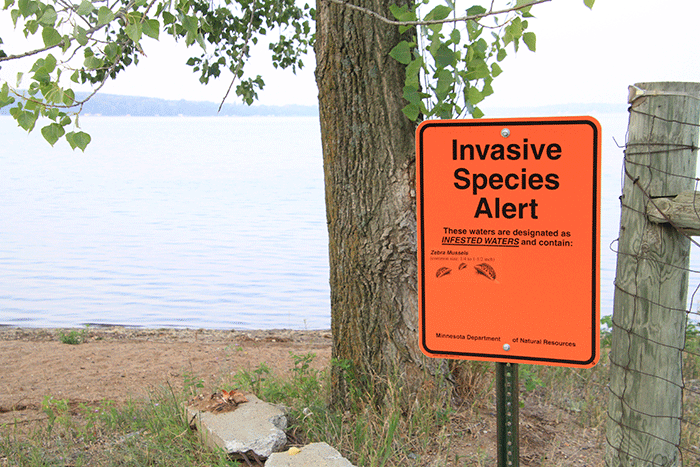Zebra mussels confirmed in Clitherall Lake in Otter Tail County
News | Published on August 2, 2021 at 9:51pm GMT+0000 | Author: Chad Koenen
0
Zebra mussels have been found in Clitherall Lake near Clitherall. A sign at the public landing now warns boaters of the discovery.
Zebra Mussels also confirmed in 3 lakes in Becker County
The Minnesota Department of Natural Resources has confirmed zebra mussels in Clitherall Lake, near the city of Clitherall in Otter Tail County; Eagle Lake, near Frazee in Becker County; and Turtle Lake, near Lake Park in Becker County.
DNR invasive species specialists followed up on a report from a lake property owner who found an adult zebra mussel attached to a native mussel in Clitherall Lake. The DNR found three more adult zebra mussels in the lake, indicating a reproducing population.
A DNR conservation officer reported zebra mussels in a sandy shallow area of Eagle Lake. A responding DNR invasive species specialist immediately found an adult zebra mussel at the public access, about one-half mile from the location of the initial report, indicating a reproducing population.
A lake user contacted the DNR after finding an adult zebra mussel in Turtle Lake. A DNR invasive species specialists found an adult zebra mussel about one-quarter mile from the location of the initial report, indicating a reproducing population.
“It’s helpful when lake users contact us if they find what might be an invasive species that’s new to a lake,” said Heidi Wolf, DNR invasive species unit supervisor. “Early detection is important, because it can help prevent spread to other lakes.”
Whether or not a lake has any invasive species, Minnesota law requires boaters and anglers to:
Clean watercraft and trailers of aquatic plants and prohibited invasive species,
Drain all water by removing drain plugs and keeping them out during transport, and
Dispose of unwanted bait in the trash.
Some invasive species are small and difficult to see at the access. To remove or kill them, take one or more of the following precautions before moving to another waterbody:
Spray with high-pressure water. Rinse with very hot water (120 degrees for at least two minutes or 140 degrees for at least 10 seconds).
Dry for at least five days.
Zebra mussels can compete with native species for food and habitat, cut the feet of swimmers, reduce the performance of boat motors, and cause expensive damage to water intake pipes.
People should contact a Minnesota DNR aquatic invasive species specialist if they think they have found zebra mussels or any other invasive species.
More information is available at www.mndnr.gov/ais.
